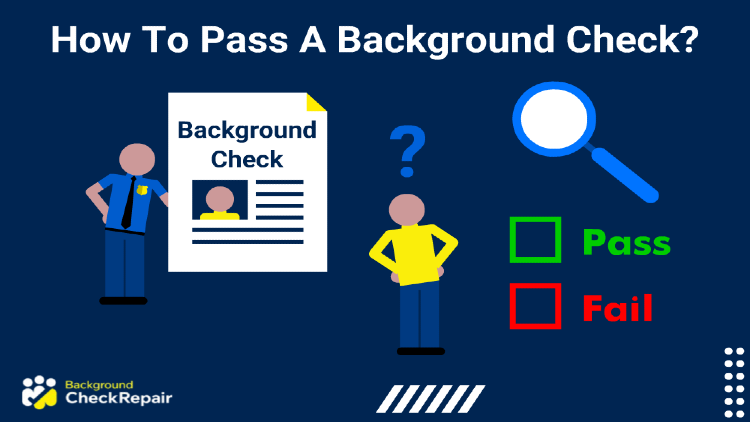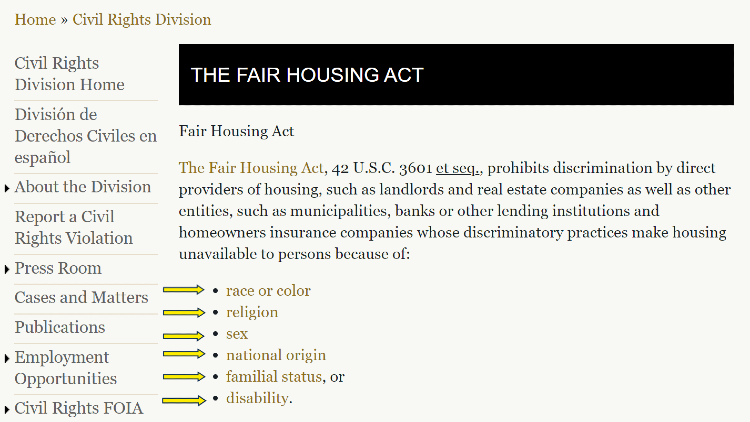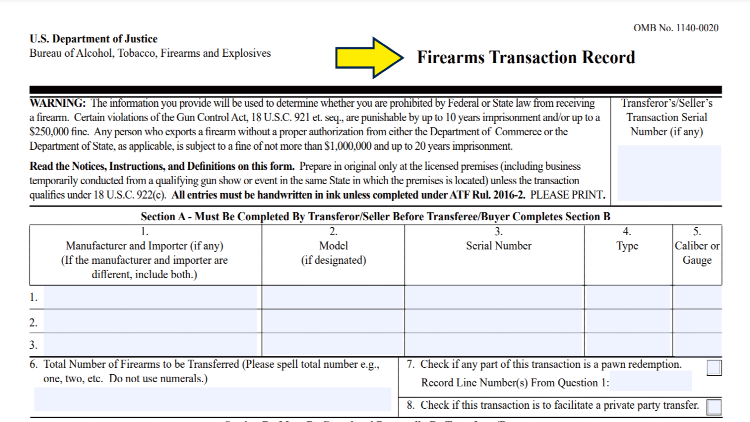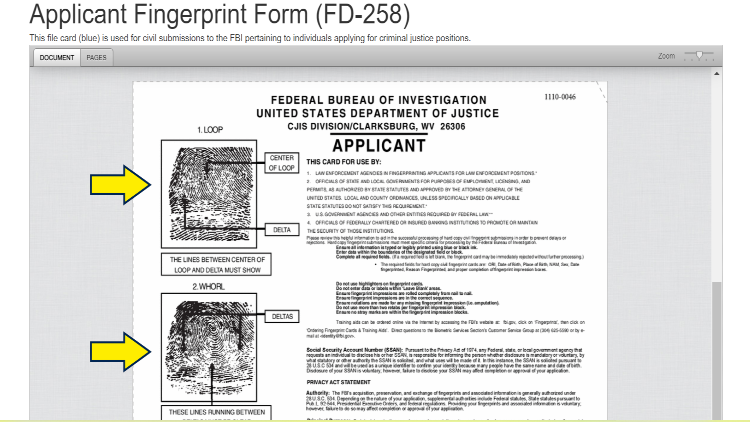
As background checks become a regular part of everyday life for employers, employees, landlords, and tenants, more people than ever before are asking how to pass a background check. The honest answer is that there is no way to 100% guarantee someone will pass a background check, but there are certain steps that anyone can follow to increase their chances of passing a background check.
Most individuals have undergone a background check at some point in their lives, most often when trying to obtain a job or an apartment, though there are other instances.23
On average, eighty percent of employers conduct background checks during the pre-hiring screening process.9, 21
Additionally, tenant screening is a regular part of rental applications with property management companies, and as many as half of private landlords run some form of background check.17
For almost one in three Americans with some form of criminal record, not to mention those with a rocky financial history, background checks can be overwhelming. But it doesn’t have to be.
Follow these 4 steps to learn how to pass a background check.
Step 1: Run a Background Check on Yourself
Have a background check looming ahead in the future? Prepare for this eventuality by running a personal background check. Conducting a full background check on one’s self is an excellent idea whether or not past criminal history is a concern. Know that neither background check companies nor the background check process is infallible, and it is so important to be aware of any recording errors that might pop up.9, 23
A personal background check can help prepare consumers for cases where:
- Records for an individual with the same legal name are pulled on accident
- Errors in reporting or recording result in criminal record inaccuracies
- Expunged or sealed convictions are still viewable
Want to learn how to perform a background check on yourself? There are many resources online for individuals who are seeking a self-background check. Get yours now!
Step 2: Determine What Kind of Background Check Will Be Run
All background checks are not created equal, and there are many varieties of background checks. Background checks on tenants or pre-employment depend largely upon what information the employer is looking for.8
With third-party background checks or consumer reporting agencies (CRAs), employers can typically build the desired background check a la carte. However, most pre-employment background checks will fall into one of two categories:
Level 3 and 4 background checks are typically reserved for highly specialized or sensitive positions.
Additionally, an employer may request an MVR report when relevant to the position, a social media background check, or credit reports. Credit reports are more commonly accessed during tenant screening.
An individual may find out what kind of background check the employer conducts by asking directly, inquiring of other employees, consulting company policy, or searching online.
Step 3: Check State Background Check Laws
There are federal laws that govern and regulate background checks, such as the Fair Credit Reporting Act (FCRA)25 and the Equal Employment Opportunity Commission (EEOC).26 Many states have additional statutes, such as “ban the box” laws, which regulate when an employment candidate can be asked about their criminal history.21
The Fair Housing Act (FHA)27 sets forth guidelines for landlord/tenant agreements and interactions, and though there is no direct mention of background checks within the FHA, several states have added protections for tenants with criminal records.

Reference the table below for state laws and guidelines in relation to employment and tenant background screening.
Step 4: Find Out What Will Show Up on the Background Check
It is difficult to master how to pass a background check without knowing what is included on a background check. Background checks are usually conducted to get a sense of an individual’s character and abilities, thus ensuring the well-being of the workplace.21 However, many employees acknowledge uncertainty with regards to the contents of a background check.19
Therefore, after conducting a personal background check, figuring out which type of background check the employer will request, and checking federal and state background check laws, the next step is to find out specifically what shows up on a background check.
Most employment background checks will include:
- Identity verification
- Work and education history
- Criminal records (local and often federal)
And some will include:
Most tenant background checks will include:
- Identity verification
- Work and residential history
- Credit report
- Criminal records (at least local)
More employers now acknowledge using social media to screen potential employees.23 In addition, background checks may also include military records and worker’s compensation records.20
| What Shows Up On Background Checks | Records Searched |
| Are tax records included in a background check? | Yes, Sometimes, depending on the situation |
| Do pending charges appear on a background check? | Yes |
| Do arrests that did not lead to convictions appear on a background check? | Yes, Sometimes, depending on where you live |
| Do police reports appear on background checks? | Yes, Sometimes, depends on the request and other factors |
| Do warrants appear on background checks? | Yes, Sometimes, depends on the type of warrant |
| Do ongoing court cases appear on a background check? | Yes, Sometimes, depends on the state |
| Are dismissed charges included in a background check? | Yes, Sometimes, depends on the state laws |
| Is deferred adjudication included in a background check? | Yes, Sometimes, depends on the type of check |
| Does probation appear on the background check? | Yes, Sometimes, depends on the type of check |
| Do arrests include background checks? | Yes, Sometimes, depending on the situation |
| Do traffic violations appear on criminal background check | Yes, Sometimes, depends on the state |
How To Pass Background Checks
The first thing to understand about how to pass a background check is that background checks do not operate on a true pass/fail basis. Per the Equal Employment Opportunity Commission (EEOC),26 employers must consider each job application on a case-by-case basis and determine how background check findings bear upon the work in question. Therefore, while a third-party background check company may generate pass/fail criteria for various areas of the report, the overall report will be sent to the employer (customer/client) for review.
Thus, after ascertaining the accuracy of the background check, determining the type of background check, getting up to speed on state background check laws, and finding out what shows up on a background check, the real question is how to gain the employer’s trust and good opinion. To do this, an individual needs an understanding of the job in question, an understanding of company values and policies, and a thoughtful way to address any adverse information that surfaces during the pre-hiring process.
It is unlikely that an employment candidate will have many opportunities to impress an employer prior to undergoing a background check, so it is of utmost importance that an applicant is open and candid during the application and interview process. Employers and employees alike report that honesty is one of the most important factors in deciding hiring outcomes. An employer is likely to view a criminal history differently when they are prepared for it and understand the circumstances surrounding it.7
How To Pass a Rental Background Check
Many unfortunate individuals have found themselves limited when seeking housing or business rental property because of past criminal records, rental history, or credit reports.2 Is there a way to offset these negative marks for a background screening? Yes, there is.
The first thing to remember is that recent offenses or mistakes have a greater impact on the background check than errors from long ago. So the best thing that can be done to offset negative marks is to demonstrate responsible behavior: timely payments, no encounters with the law, and good financial decision-making.
The second thing to remember is that a landlord or renter will want proof of responsible behavior. This is where character references come in. The value of character references when seeking to rent cannot be overstated, particularly if a strong reference from a prior landlord can be secured.
Thirdly, be honest and forthright about any application concerns. Landlords and renters may be willing to negotiate rental terms.
How To Pass a Background Check for an Apartment
Know that while large apartment complexes are generally run by property management companies that almost always conduct tenant background checks, there are still much smaller or privately owned apartments that do not partake in the background check process. These may provide a great option for individuals struggling to find housing.
In the absence of this type of option, be prepared with excellent character references and proof of solid efforts to improve credit reports and financial situation (e.g. pay stubs, bank statements).2
For individuals wondering “Is eviction included in your record?”, the answer is that it does. However, evictions should fall off rental history reports after a period of seven years.2
How To Pass a Background Check for a Firearm
The National Instant Criminal Background Check System (NICS)28 conducts background checks for firearms. When an individual seeks to purchase a firearm from a Federal Firearm Licensee (FFL), they must complete a Firearms Transaction Record (ATF Form 4473)29 which details the prospective buyer’s identifying information as well as personal information relevant to safe ownership of a lethal weapon (criminal history, mental health history, military service records).1

The FFL then contacts the NICS and provides the ATF Form 4473 so that the NICS can conduct a background check. This process is typically completed in just a few minutes. If the background check is not completed within three days, some states may allow the FFL to complete the sale of the firearm without it, despite the possibility that significant background investigative findings are causing the delay.1
To increase the likelihood of passing a firearm background check, review the state laws beforehand as many states have statutes for private sellers in addition to FFLs and regulate the sale and transfer of various types of firearms differently.5 For example, in the state of New Jersey, individuals must have a permit to purchase a handgun or a Firearms Purchaser Identification Card (FPIC) to purchase rifles or shotguns (see N.J. Stat. Ann. § 2C:58-3a, 3f, 3i).
To recap, a successful background check for a firearm entails knowing and understanding state and federal gun laws and being prepared to complete the ATF Form honestly.
How To Pass a Criminal Background Check
An individual’s criminal record is the obstacle that is most likely to interfere with employment opportunities. Criminal background checks are becoming a customary aspect of the background screening process. While Level 1 background checks only access local criminal records, every other level will search local, state, and federal records to aggregate an individual’s criminal history. This means that any conviction within the last seven to ten years will almost certainly appear on a criminal background check.
The easiest way to pass a criminal background check is to maintain a clean criminal record. If there is uncertainty surrounding someone’s criminal history, and even if an individual believes they have a clean criminal record, it is always advisable to know how to perform a criminal background check on yourself to verify that records are accurate.
For individuals with negative marks on their criminal records, the best course of action is to ensure that all probationary periods and fines are resolved and then apply to have the records sealed or expunged. In most states, and for typical background checks, sealed and expunged records will not show up. Once a record is sealed or expunged, the applicant need not admit to having a criminal history at all.
Note that government employment does not follow these same guidelines, and prospective hires will undergo a much more stringent background check process.
If the criminal background check comes back with significant findings, the employer must notify the candidate, per the FCRA,25 so that the candidate may address or dispute any concerns.
The candidate can offer character references and evidence of changed behavior to help offset criminal reports.11
How To Pass a Fingerprint Background Check
A fingerprint background check is more rigorous than the name-based method used for level 1 background checks. An individual must submit fingerprints for analysis. The fingerprints are compared against state and federal criminal records. Naturally, a fingerprint background check provides a much more comprehensive view of an individual’s criminal history. While this may not be a concern for some individuals, many others may experience significant distress during this process.

To prepare for a fingerprint background check, an individual should request their local, state, and federal criminal records to ascertain the accuracy of the reports. If there are any inaccuracies, the individual should contact the relevant courts to resolve the issue. This is also a good time to pursue expungements for any applicable convictions.
As with all other background checks, the value of honesty during the application and interview process is paramount. Many employers understand that individuals make mistakes and are open to providing second chances.16
How To Pass a Level 2 Background Check
A level 2 background check is a fingerprint-based check that returns information on local, state, and federal criminal records. Though Florida is the only state to have officially defined level 2 background checks, they are the most common comprehensive background checks nationwide.14 Level 2 background checks are primarily used for in-depth criminal history checks on individuals who are applying to work with vulnerable populations (children, elderly, disabled, ill).
To pass a level 2 background check, an individual must be aware of the substance of their criminal record and be prepared to address any concerns honestly during the interview process.
While certain criminal convictions, such as those of a violent or sexual nature, will automatically bar an individual from various types of employment, other offenses may be expunged or sealed after a probationary period to allow the individual more employment opportunities.
To pass a level 2 background check:
- Get copies of local, state, and federal criminal records
- Address record inaccuracies
- Petition for expungement of misdemeanors and in some states, felonies
- Apply for jobs that are less likely to be impacted by the criminal offense
- Be honest about criminal history during the interview
How To Pass a Background Check for Employment
Employment is the most common reason why a background check may be conducted, as employers want to make smart hiring decisions that do not pose a risk to the company. From the outset of the application process, employers are watchful for any sign of deception. Therefore, it is critical that individuals be honest during the application and interview process.9 In other words:
- Use the correct legal name
- Be precise and complete with past education and employment information
- Be honest about criminal convictions.
How To Pass a Background Check With a Criminal Record
Many states now follow EEOC26 guidelines and have instituted “Ban the Box” laws which disallow employers from asking about criminal convictions until after a conditional job offer has been made. This allows job candidates to make an impression upon the employer before wrestling with a past criminal conviction. There are still a large minority of states without “Ban the Box” laws, and in these states, individuals are required to disclose criminal history on the job application. If this is the case, be sure to use any available space to explain the circumstances and reparations made in concise terms.9
If a criminal offense can be expunged, definitely pursue it. A clean criminal record is always the best kind. If convictions cannot be expunged, know that honesty, excellent character references, and substantiated employment history can offset minor criminal offenses.
How To Pass a Background Check With a Misdemeanor
Nearly one in three Americans have some form of criminal record, and the vast majority of these are misdemeanor charges.6 A misdemeanor is a criminal offense that is less serious than a felony and results in penalties such as probation, minor jail time, fines, and community service.
In many states, it is possible to have misdemeanor offenses expunged from the criminal record after the probationary period has passed. This is always an advisable course of action. Although misdemeanor offenses do not impact background checks to the same degree as felony offenses, they can still put applicants at a disadvantage during the pre-employment process.12
If it is not possible to have a misdemeanor expunged, come prepared to explain the circumstances surrounding the crime and provide ample evidence of behavioral change (character references, past employer letters, documentation of probation completion).
ALWAYS be honest with the employer.
How To Pass a Background Check With a Felony
Passing a background check with a felony conviction is tricky, especially if the felony conviction was for a violent crime. Violent felony convictions automatically bar individuals from many customer-facing and public-facing jobs.
However, many states do allow felony convictions to be reduced to misdemeanors or even expunged after a certain period of time.13 If this recourse is available, it should absolutely be pursued to provide an individual with their best chance at a fresh start.
For records that cannot be expunged or reduced, evidence of rehabilitation, diversion programs, recovery programs, therapy, etc., and strong character references can help mitigate the impact of felony convictions.
How To Know If You Pass a Background Check (How To Know If You Will Pass a Background Check)
Occasionally, individuals are stuck waiting to hear back from an employer for weeks, wondering How can I find out if I passed my background check. Here are a few things to note.
Firstly, per the FCRA,25 employers are required by law to notify candidates who were disqualified due to a background investigation. This pre-adverse action notice allows a candidate to review background reports for inaccuracies and dispute a claim.
Secondly, if an employer proceeds with the hiring process or sends further employment information, it is likely that the background check was eligible.10
If no further information has been received, the employer may be contacted for an update on the background check. If the delay is with the third-party background checking service, the agency can be contacted directly. Some agencies have online portals for background check status updates.4
There are various status codes that may be associated with a background check report. These are briefly explained in the table below.
| Background Check Status Codes | Status Codes Explained |
| Canceled | Report or aspect of the report is canceled |
| Clear | Passed background check |
| Completed | Report or sections of the report are finished |
| Consider | A specific element of the report requires manual review |
| Decisional | The background check report requires a manual review |
| Disabled | The report is canceled at no charge to the consumer |
| Discrepancy | Inconsistency between candidate report and verification report |
| Eligible | The green light on a background check. The individual is all clear to proceed |
| Pass | The adjudication matrix has determined that an element of the background check does not require further review by employing a company |
| Record Judged | Similar to “complete;” indicates a section of the report is finished |
| Review | Element requires evaluation by the hiring team |
| Unperformable | The background check cannot be completed due to incomplete or inaccurate information |
How Long Does It Take To Pass a Background Check?
While standard background checks can be completed in one to three days, more thorough background checks may take as long as a few weeks to generate the report. If a month has elapsed with no word, contact the employer and background check company for an update.
Most adults have been the subject of background checks at some point in their lives. For persons with a less-than-perfect employment history, credit history, or criminal history, the prospect of a background check may seem daunting. Individuals who are concerned about how to pass a background check can review the steps outlined above to increase their chances of success.
Frequently Asked Questions About How To Pass a Background Check





